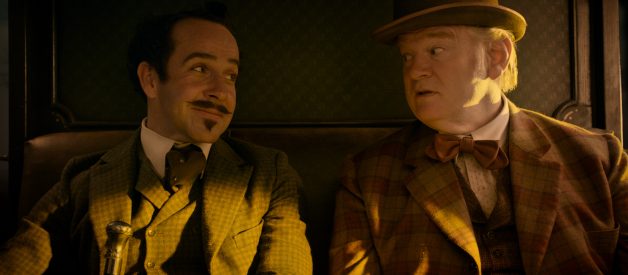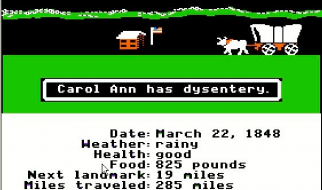(Friends, this movie has been out for a good seven months, but I feel compelled nonetheless to warn you of the many spoilers to be found herein. Likely you would derive more enjoyment from the film, and from the article, were you to experience them in that order. It?s on Netflix.)
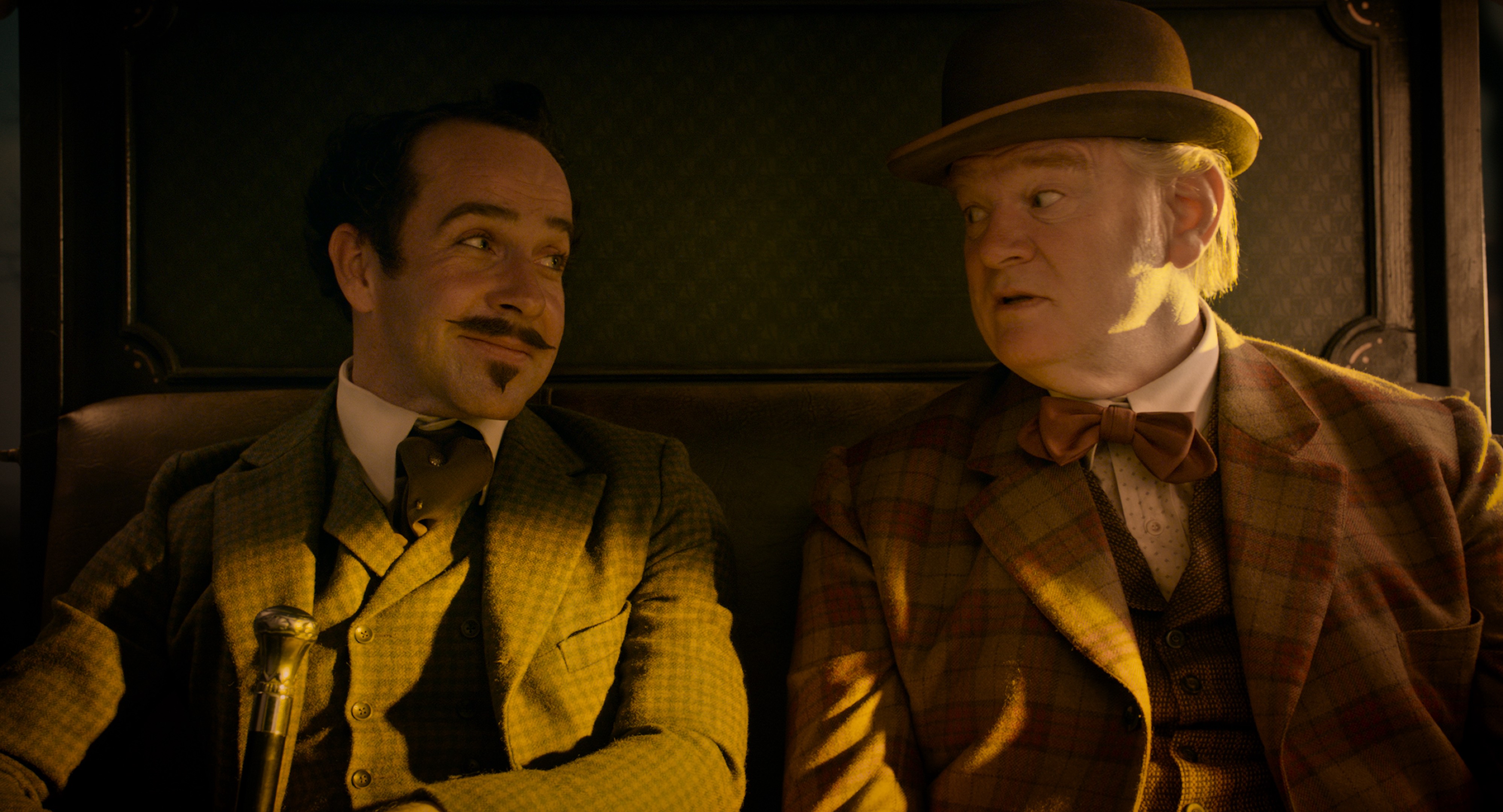 As much as anybody?s
As much as anybody?s
As sharp-eyed readers have likely noticed, this is the sixth in a series of articles, each one focused on one of the six vignettes which comprise the Coen Brothers? latest film. Those articles are linked below:
The Ballad of Buster Scruggs, in which Tim Blake Nelson as a sort of Roy Rogers/Doc Holiday hybrid gets killed by the guy from Old Crow Medicine Show
Near Algodones, starring James Franco as a doomed parody of Clint Eastwood who gets gets killed by the dad from The VVitch, and then by a different guy
Meal Ticket, wherein Liam Neeson murders the mean kid from Harry Potter
All Gold Canyon, featuring Tom Waits chewing up a lot of gorgeous scenery and then killing some anonymous fellow (and the natural world as a whole)
The Gal Who Got Rattled, a bracingly naturalistic frontier tragedy with no really famous people, but lots of killing
And this, the final episode, The Mortal Remains, the review of which you?re reading right now.
What I?m saying is: The Ballad of Buster Scruggs is a movie about death. Created as it is by Joel and Ethan Coen, it?s much more complex than that; but all its absurdities and elaborations revolve around death in the same way A Serious Man revolves around uncertainty, and Raising Arizona revolves around love. The book-within-a-movie that serves as its framing device begins with a two-page illustration of an exhausted horse and cowboy riding through a cemetery. Its title character is a coldblooded cartoon cowboy with the nickname ?The Herald of Demise? (among many others) who kills almost everyone he meets with a grin on his face. Four of its six chapters end with the death of the lead character, and here in Chapter 6 they?re all dead before it starts.
This is never stated explicitly, and the argument could be made that the ?reapers? featured here are simply bounty hunters who enjoy giving their fellow travelers a good spook; but I?d say they?re intended to be bona fide angels of death tasked with escorting their three unfortunate carriage-mates to the afterlife. Chapter 1 of this rollicking movie is a singing cowboy flick a la Roy Rogers, Chapter 2 is a Sergio Leone spaghetti Western, Chapter 5 is a hopeful wagon train odyssey in the vein of The Big Trail and Wagon Master, and Chapter 6 is an Old West ghost story straight out of Ambrose Bierce. That lingering ?Or are they?? is an essential genre trope.
The second major theme of this movie is virtue, specifically an old-world Western virtue (self-sufficiency, plain speech, knowledge of the wilderness, a cool head, and the ability to kill) contrasted with the ways of city folk (portrayed for the most part as shrill, soft, foolish, arrogant, and hysterical). Those two sides of the coin are here represented by The Trapper and The Lady (who we can call Mrs. Benjamin, based on the name she gives for her husband). We have also The Gambler (his name is Rene), representing a knowing and cynical remove from the question of virtue, a man who thinks he sees through all of that to the true amoral nature of human experience. Then of course we have The Reapers (Clarence the Irishman and his nameless British ?Boss?), the only ones in the carriage who understand what?s actually going on, who watch their three charges with bemused fascination as they ?negotiate the passage? through an argument about human nature. These roles take almost the entire chapter to develop, and they develop through a single extended conversation.
Speaking is, in fact, the third major theme of Buster Scruggs ? the subject of speaking itself, and of singing. Buster exists in a world where singing is inexorably tied with gunfighting. He?s loquacious to a fault, his sardonic verbosity leading him endlessly into lethal confrontations with his gruff fellows and occluding his own sadism and hubris. The bank robber in ?Near Algodones? goes wordlessly through a world of chatterboxes who best him at every turn. ?Meal Ticket? vacillates between long sequences of The Artist orating to hushed crowds, and his private life with an Impresario father figure who never speaks to him at all but instead sings drunken Irish ballads. Like Buster, old Bill enters and exits singing, and holds a three-day conversation with a hidden vein of gold in ?All Gold Canyon;? seeming almost to summon his journey into existence through speech like an Aboriginal songline. Billy Knapp and Alice Longabaugh discover their love for one another through a series of clear and revealing conversations, having lived their respective lives surrounded by short-spoken range riders like Mr. Arthur and intolerable city slickers like Gilbert and the folks at the boarding house. ?The Mortal Remains? brings it all onto the examining table ? three archetypes of the West debate virtue while two angels of death moderate and pause for occasional songs. This is what inspired the title of this very series ? the film itself is a conversation, and I?ve done my best to have a conversation with it. ?The Mortal Remains? is such a rich episode, and so much in it pertains to the film as a whole, I?ve fought the urge to examine it line-by-line. Let?s get into it.
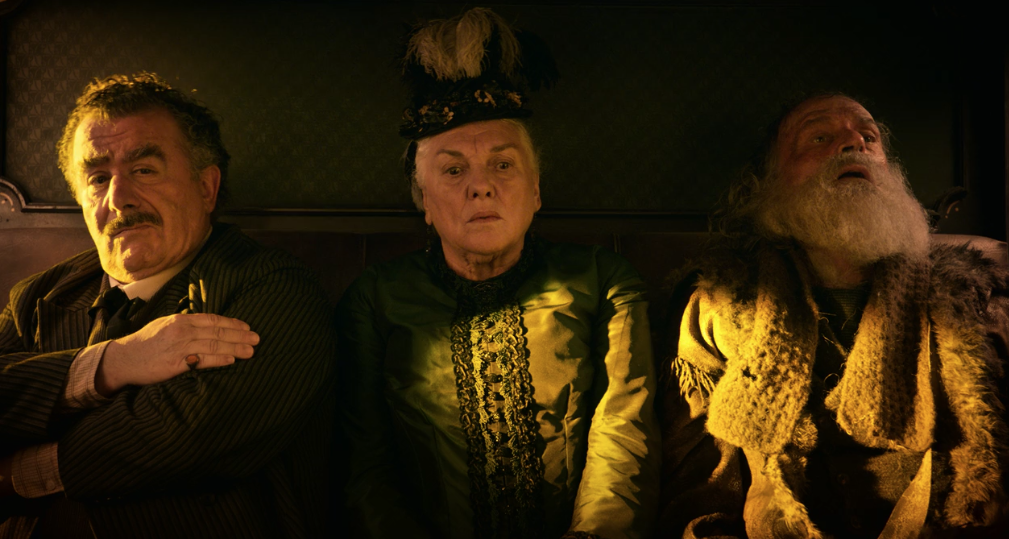 Three sides of a coin. (What a cast!)
Three sides of a coin. (What a cast!)
The opening illustration for this chapter is that of an ominous figure seated on a carriage, his face unseen, his bullwhip curling to drive his horse onward through the fog. ?Whether or not he heard,? reads the caption, ?the coachman did not slow.? This exact image is shown at a turning point in the passengers? understanding of their fate, when The Gambler leans out the window to demand that the carriage must stop because The Lady is having something like an asthma attack. It?s the moment, roughly midpoint, when our ghostly trio begins to suspect the truth.
Aside from the opening image of a sunset over the prairie, we?re deprived of the panoramic outdoor shots and iconic Magic Hour natural lighting that characterize most of this movie?s vignettes, in favor of a claustrophobic composition showing people packed uncomfortably into a too-small space (similar to the first segment of ?The Gal Who Got Rattled?). The Englishman begins to sing a song, ?Has Anybody Here Seen Molly,? about a lovely young woman who has vanished in London while on holiday with her beau, and his futile attempts to find her. This is adapted from the British musical hall song ?Has Anybody Here Seen Kelly? (by C.W. Murphy and Will Letters, incorporating material from Florrie Forde?s popular 1909 version). This version swaps the gender of the missing paramour, and subtly suggests that Molly may have died or been abducted into a bordello, as opposed to Kelly?s implied abandonment of his companion in the original. His song startles The Trapper out of sleep (intentionally?), and distracts The Lady and The Gambler from pondering The Holy Bible and staring out the window at the darkness (probably not a tip of the hat to Kenny Rogers, but I want it to be). He apologizes for waking them up. The Trapper insists that he was not asleep, and The Englishman?s eyes glint as he agrees with a wink.
?Oh! Not asleep. I see.?
We soon discover that this quintet is headed for Fort Morgan (likely Fort Morgan, Colorado; and likely chosen for its resemblance to the word ?morgue?). The Englishman has been there before ?many times, carrying? cargo.? He points to the roof.
?Him?s yours?? asks The Trapper, revealing the presence of a dead body atop the carriage.
?As much as he?s anyone?s,? says The Englishman to his friend, ?isn?t he Clarence??
?As much as anyone?s,? says The Irishman.
Jonjo O?Neil, a stage actor revered for his work with the Royal Shakespeare Company and rarely seen on film, is exquisite as The Boss. The far more recognizable Brendan Gleeson (the tough guy barber in Gangs of New York, Mad Eye Moody in Harry Potter, the kindly hit man of In Bruges, etc.) says as much with his facial expressions as O?Neil does with his words and his piercing eyes. Their relationship in this film should be used in acting courses as a model of subtext, of conveying unspoken communication between two characters who know each other well, and of portraying people who are not what they seem. It?s just delicious.
The Trapper (a hilarious and unrecognizable Chelcie Ross) seizes the floor and begins a rambling, unbidden monologue about himself, first concerning the very fact of his own tedious and unpleasant nature, and how he likes to talk to people. He informs his put-upon listeners that he spends most of his time alone in the wild, but that he would often descend into town after not speaking for a great while, in order to share the many thoughts and experiences he had stored up; until he was eventually told by the barkeep not to come back to his favorite saloon because of his tediousness. The Lady (Broadway and television powerhouse Tyne Daily, in what might be the finest performance of her film career) is disgusted by his breath and his crude manner; and The Gambler (the prolific and accomplished Saul Rubinek, absolutely knocking it out of the park) rolls his eyes and looks away; but The Trapper rambles on, and The Reapers listen with rapt and kind attention.
He continues on the subject of speaking, how another person?s voice can be a great comfort even if you don?t know what they?re saying. He tells the story of a Native woman who he met in the mountains, that they lived together as partners for some time without ever knowing each other?s names, and developed an overall understanding of one another?s states of mind even though they couldn?t speak the same language. When The Irishman asks, he says he doesn?t know if he loved her or not, but that the sounds she made and the look on her face made him realize that ?people are like ferrets? ? that is, they are all the same, one no different from the other.
?I don?t doubt it?s the same, even if you travel to Siam.?
This angers The Lady. She says there are two kinds of person, and they?re completely distinct. This gives us a chance to understand each character?s essential view of human beings and how they relate.
The Frenchman says, ?Lucky and unlucky?? To him it?s all a roll of the dice, the luck of the draw. This point of view is expressed in ?Near Algodones,? and throughout the Coens? most recent decade of films; most clearly in the aforementioned A Serious Man.
?No,? replies Clarence, ?Hale and frail! Difficult to knock to the floor, or wilting.? Human nature, to him, is one of combat ? the strong prevailing over the weak regardless of their rectitude. We see this throughout Buster Scruggs ? consider ?Meal Ticket? and ?The Gal Who Got Rattled.?
The Trapper repeats that there is no difference between people, ?unless you mean trapper and townsman.? I said the contrast between the virtues of the solitary outdoorsman and those of communal modern townsfolk are central to the entire film.
Tyne insists the two types are ?upright and sinning,? and furthermore that The Trapper himself knows this to be true.
?I challenge your credentials, madam, for judging human worth,? The Trapper replies.
Indeed, The Lady is intensely judgmental, absolutely sure of herself, not accepting any possibility that she could be wrong, because she has learned her truth from the Bible and from her very accomplished and intelligent husband Dr. Benjamin. In her view, nobody in the stagecoach is her equal, nor the equal of her husband. Of the two, The Trapper better exemplifies the qualities of goodness that The Lady believes in, but she can?t see beyond his rough habits.
The Boss, too, has a reserved sense of superiority, a gentle arrogance, but is still polite and mostly good-natured. His is the attitude of an exceptionally wise and engaged schoolteacher, coaxing understanding from a precocious child. The Lady won?t let him finish a sentence. She explains that she?s been separated from her husband for some time. She still admires him, speaks highly of him ? she repeatedly refers to him in the past tense, then corrects herself ? he still is considered ?one of the foremost lecturers on moral hygiene and spiritual betterment.?
?I?m not an enemy of ?betterment,? but I am kept very busy with my traps.? ? she laughs at this.
The theme of language is everywhere in this chapter. There is the same formal and careful construction of sentences here that we saw in ?Buster Scruggs? and ?The Gal Who Got Rattled,? and in the Coens? True Grit. Even The Trapper takes great care to speak plainly and eloquently, and to be fair and respectful in all his statements. It?s the absent Dr. Benjamin?s job to talk ? he?s famous for giving speeches ? and his wife too is a forceful and direct speaker ready to debate at the drop of a hat. In the film as a whole, talking too much is not seen as a virtue, but careful and direct speech is virtuous if you?re talking about something worthwhile (like Alice Longabaugh and Billy Knapp?s conversation about Certainty).
When The Lady explains the circumstances of her husband having been out East for a while, and that he?s been sick, the Englishman and the Irishman share a knowing bemused look. ?He awaits you in Fort Morgan,? says the Englishman, not phrasing it as a question. Her husband, we come to understand, is already dead; but The Lady won?t allow this thought to take purchase in her mind. She says that she?s been living with her daughter while Dr. Benjamin has been ill, and now looks forward to their reunion.
Into the conversation proper comes the gambler. He is clearly meant to be an aged version of the French gambler seated at the table with Curly Joe in the ?Buster Scruggs? chapter ? he has the same pomaded hairstyle, and a very similar style of speech and dress.
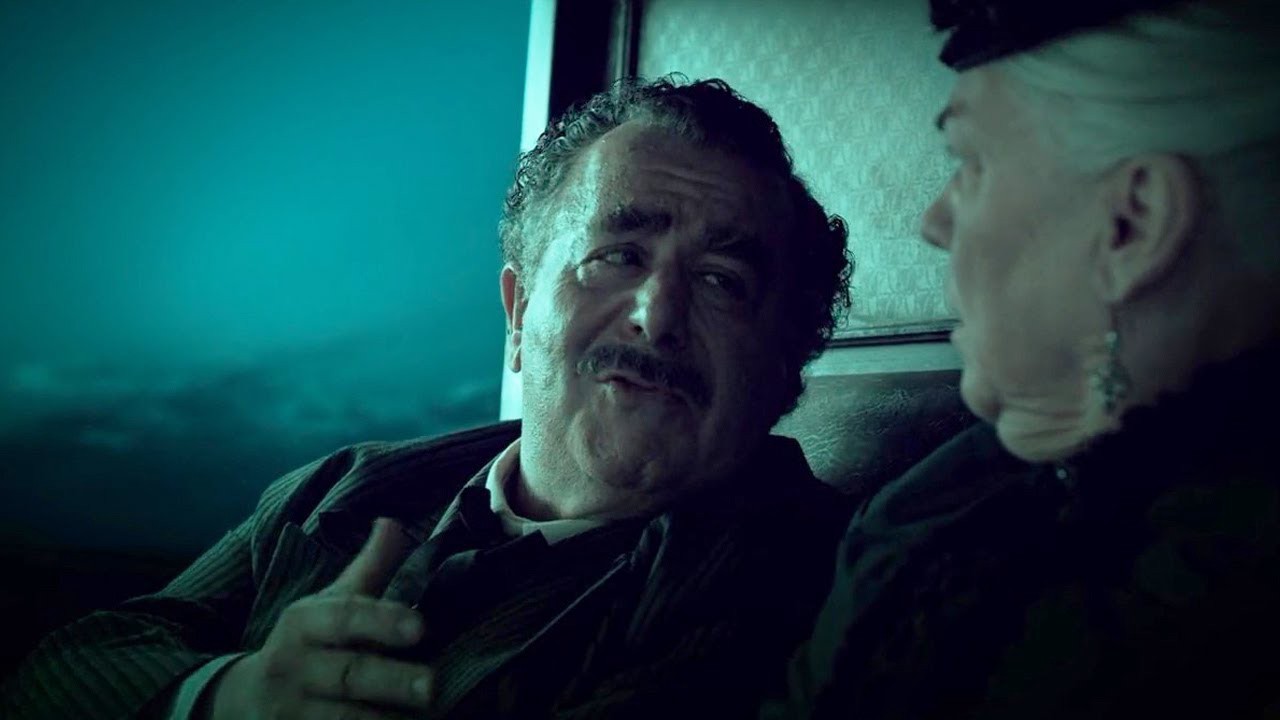 The man has a point.
The man has a point.
?A parent should not burden the household of their child, it is not right.?
We learn some things about Rene?s nature. Unlike The Trapper, he responds to The Lady?s judgmental nature and limited worldview by using his words to intentionally insult and upset her. He points out the applicability of the Tedious Man?s story about being able to understand his Indian lover based only on her facial expressions, and how The Lady must have known she wasn?t truly welcome in her daughter?s home. This is easy to imagine ? the Lady is unpleasant company. She relies on others to keep her alive, she is ill-natured, she goes on and on about unimportant things. The Trapper, we have seen, has many insights and observations from his solitary and hard-working life. The Lady, who has all the time in the world to think, has no original insights but only the teachings of her husband and the Bible. The Gambler insists that one person can never know another one completely ? that each of us is for one thing completely unique, and for another completely hidden from others.
?We can know each other, oui, to a certain level; but to know entire? Impossible? We each have a life,? he tells The Lady. ?Each, a life. Only our own.? Rene often shares knowing looks with the Reapers, seeing the other passengers from an ironic distance, though in fact they are in on an even greater understanding than he.
She chafes. ?You know nothing of me, or my domestic affairs.?
?I know that we must each spin our own wheel, play our own hand.?
The Gambler then relates the story that preceded Buster Scruggs? arrival at the poker table, of his friend Chipolski who had to leave mid-game and asked Rene to play his hand for him. He tells how he refused to do so, because a man?s bets are based on who he is, his entire relationship to the world and to the game; and therefore one man can never bet on behalf of another. This, of course, led to Curly Joe?s demand that Buster play that same hand, The Dead Man?s Hand, which led to a shocking series of murders and dismemberments (and one musical number).
?I cannot bet for you, pourqois pas, I cannot know you. We each must play our own hand.?
?You can know him!? argues The Trapper. ?People are like ferrets!?
We have arrived at the crux of the argument. Is everyone the same, aside from superficial qualities? Is everyone separated based on sin vs goodness? Is everyone a complex and unique mystery, unknowable to any other person and subject only to the rules of chance? The Lady reduces her argument against Rene to a simple matter of his being a sinner because he is a gambler and leads a life of ?vice and ?dissipation.?
?No conclusions drawn from such an existence will apply to a life rightly lived,? she says with certainty.
The Gambler rolls his eyes. ?The cards will teach you what you need to know.?
Rene brings back the matter of uncertainty ? maybe Dr. Benjamin no longer loves his wife, since they?ve been apart so long.
?Now hold on there, Mister?? The Trapper is offended now, because the Frenchman is becoming adversarial and rude toward Mrs. Benjamin, and also because he addresses the matter of physical love (even obliquely). There is a question throughout this chapter about what is acceptable to say ? where does plain speech and honesty cross over into cruelty or impropriety?
The Lady, growing truly upset, argues that relationships are eternal, among good people. ?Decent people remain true, to others and to themselves.?
The Gambler is on a roll. ?The word love would mean something quite different to such a person who commands the love of the crowd than it would to someone who can only coax love through subservience? The person widely admired, they accept love as a tribute. And he confers his own love as an honor; for coming from him, it must have great worth. But you, Madame, you would not receive this gift splendidly, as one that has no need, but you would grasp at it like a beggar!?
The Trapper gets angry again (?Ain?t no call for that!?) because the gambler is crossing a line and being rude to a lady. Though Mrs Benjamin has shown The Trapper no respect, he nonetheless sticks to his own standards of respectful behavior toward her. His Western virtue is impeccable, but in The Lady?s world he?s the lowest of the low. There?s a communication barrier that can?t be overcome ? these three individuals are separated by wide gulfs of language, lifestyle, and experience. Who among them is correct? Who among them is virtuous? Does being correct confer virtue, or is it about something else ? doing what?s morally right? And if the latter, then who decides what?s right?
?The great man, the admired man, he might well accept other love constantly as his due,? cajoles The Gambler, relishing this opportunity to turn The Lady?s most cherished beliefs on their heads, ?and why not, if his admirer is comely? It is a love of a different kind, of course, than the domestic. But in France, we say-? The Lady cuts him off, beating him furiously with her umbrella, until she begins to have something like an asthma attack and loses the ability to breathe. The chaos in the carriage reaches its pinnacle, as The Gambler realizes with horror that he may have killed the lady with his cruel talk and demands that the coachman stop. By this point, any audience member with their thinking cap on must at least have considered the idea that she?s dead already; but none of the three passengers gets it.
?The coachman won?t stop,? the Boss explains calmly. ?He never stops. Policy.?
I stumbled upon a short but highly intriguing article on a webpage called Od?s Blog, which suggests that not only The Gambler but all the people in the carriage are meant to reflect characters from earlier chapters. The Trapper is Bill the prospector, The Irishman is The Impresario, and The Lady represents Alice Longabaugh (or possibly, I would suggest, the old lady who runs the boarding house at the beginning of ?The Gal Who Got Rattled,? who shares her unpleasant disposition and her predeliction for elaborate hats.) That author relates The Englishman to ?Near Algodones,? which is neat in that it connects each of them to one of the preceding chapters; but I?m more partial to the idea that The Englishman is The Artist, reunited in death with the father figure who never showed him love and killed him for expediency. Not to come across as a man obsessed with haircuts, but there?s a marked similarity in coiffure between The Artist and The Englishman, and they both excel at telling stories; just as The Irishman and The Impresario excel at singing Irish folk ballads and killing people without remorse. I don?t find Od?s view to be persuasive as regards the filmed version of ?The Mortal Remains;? but I am given to wonder whether an early version of this vignette might indeed have featured these characters post-mortem, just as I?ve wondered whether ?The Gal Who Got Rattled? is in part a recasting of the three lead characters from True Grit. But I digress.
As The Lady resumes breathing and the scene quiets down, they do start to get it. It?s in their eyes, their wordless stares. It occurs to them, but they don?t believe it, and they can?t think of anything to say. The Irishman and the Englishman share another wordless exchange (like the ones being discussed between The Trapper and his lover, The Lady and her daughter) and then the Irishman begins to sing:
As I was a-walkingDown by the lochAs I was a walking one morning of lateWho should I spyBut my own dear comrade?Wrapped up in flannelSo hard is his fate
I boldly stepped up toAnd kindly did ask himWhy are you wrapped up in flannel so white?My body is injuredAnd sadly disorderedAll by a young womanMy own heart?s delight
Oh had she but told meWhen she disordered meHad she but told me of it at the timeI might have got saltsOr pills of white mercuryBut now I?m cut downIn the height of my prime
Get six pretty maidensTo carry my coffinAnd six pretty maidensTo bear up my pallAnd give to each of themBunches of rosesThat they may not smell meAs they go along
This is ?The Unfortunate Lad,? known also as ?The Unfortunate Rake,? a traditional Irish ballad about a man who?s dying of syphilis that he contracted from his true love (generally thought to be a prostitute). You can read all about this highly influential song here. It is, among other things, a source of the New Orleans jazz standard ?St. James Infirmary,? performed at every jazz funeral in that lore-steeped city; and of the old cowboy ballad ?The Streets of Laredo.? This melody is also the main theme music of The Ballad of Buster Scruggs, played over the opening credits. It?s the fundamental folk song about death, you might say, and the passengers in this carriage know it. Clarence delivers the song in a gentle yet earnest manner. If this is the carriage of death, and these two are angels of death, then this is the Irishman doing his best to break the news to the three passengers that they are dead. They listen in horror and amazement, denial and disbelief. Can the thought on their minds possibly be true?
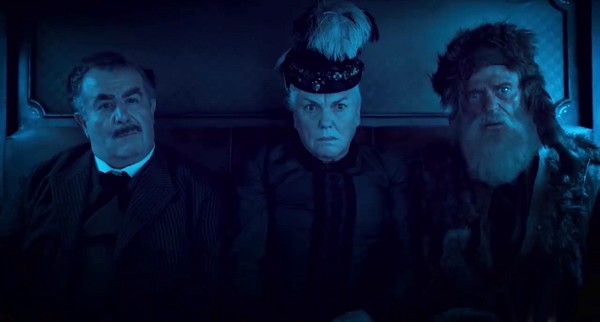 Now who?s paying attention?
Now who?s paying attention?
The silence is broken by The Englishman apologizing for crying. He tells the passengers that Clarence sings this song every time they make this trip to Fort Morgan (a sort of Purgatory, the place where dead souls first land), which they do often in their line of work. And what line of work is that, asks The Trapper.
The Englishman?s reply is the first time this subject is directly discussed.
?I like to say that we?re? reapers.? This is the first, and only, time the word is used.
?Harvesters of souls,? clarifies The Irishman.
?We help people who have been adjudged to be ripe.? This is both their passion and their duty. Subsequent viewings show this from the very start ? the Reapers are there to listen to these recently-deceased people and help them to process their lives and deaths.
Right away, the trapper assigns a worldly explanation to these words. ?You?re bounty hunters.?
The Englishman?s dashing reply leaves it open ? are they in fact bounty hunters, and using these ?reaper? terms as a way of addressing their profession in a grandiose or poetic manner; or are they literal Grim Reapers, and accepting the label ?bounty hunter? as a sort of earthly equivalent? We learn the corpse on the roof is named Mr. Thorpe, a rare detail into which I have not yet read any special hidden meaning, and that a large price was offered for his retrieval. The Lady asks what he did.
?I don?t know. Doesn?t matter. As you said, Madame, there are two kinds of people. In our business, they are: Dead, and Alive.? This can be seen as the final word on the moral compass of The Ballad of Buster Scruggs. Perhaps this is the only real truth about human nature, ascendant over questions of Good vs Evil, Civilization vs. Nature, Strong vs. Weak, and even over the amoral rule of Fortune. Either you live, or you die. When asked, Englishman makes it clear that he and his partner only take them dead. The Trapper notes the similarity of their professions: He doesn?t take his quarry alive, either. Nature keeps close council with Death.
The Englishman explains how they do their work: The Boss distracts them with a story, Clarence thumps them on the head while they?re distracted. The gambler and the lady remain in stunned introspective silence, but The Trapper continues his straightforward line of questioning. He intends to get to the bottom of this.
?I told him the story of the Midnight Caller.?
(thump thump thump with his cane)
?No, don?t open it, mother! What living thing could be out in such a storm??
?The Midnight Caller? is most often used to refer to a parable from the book of Luke (11:5?8), meant to show that being persistent in asking for something is the best way to get it. It goes like this (KJV):
5 And he [ed. ? Jesus] said unto them, Which of you shall have a friend, and shall go unto him at midnight, and say unto him, Friend, lend me three loaves;
6 For a friend of mine in his journey is come to me, and I have nothing to set before him?
7 And he from within shall answer and say, Trouble me not: the door is now shut, and my children are with me in bed; I cannot rise and give thee.
8 I say unto you, Though he will not rise and give him, because he is his friend, yet because of his importunity he will rise and give him as many as he needeth.
Basically, Jesus is telling his disciples that they should go ahead and ask God for whatever they want, because the sheer audacity of their request will inspire Him to grant it. That?s not the story that The Englishman means, however. The story the Englishman is referring to is more like the final movement of The Monkey?s Paw by W.W. Jacobs ? a son or father or husband has died, a wish or prayer is made to bring him back to life, but when he arrives at their door he is a horror and an abomination. Interestingly, in The Coen Brothers? True Grit, Mattie Ross offers to tell ?the story of The Midnight Caller? around the camp fire, and also seems to be referring to a ghost story and not a Christian parable. I wonder if The Coens have their stories mixed up? At any rate, The Englishman is evidently telling a tale similar to The Monkey?s Paw ? there are many such stories ? and the moral of that story is in opposition to that of the biblical Midnight Caller parable: That you must be careful what you wish for, because you might get it. More to the point, this once again suggests that these three passengers may be just as dead as the corpse in the coffin above. The Reapers are trying to ease the other three into this difficult realization by singing songs and telling stories about death and dying. He tells them so.
?You know the story. But people can?t get enough of them, like little children? because they connect the story to themselves.? Again, a knowing look from the Irishman. This is the very method they have just described ? the Englishman is distracting them with a story, the Irishman is trying with his facial expressions to ?thump them on the head? ? to break the news that they?re dead already. The horror in their faces, their stunned silence, deepens as the Reapers? time-tested method gradually succeeds.
?And we love hearing about ourselves, as long as the people in the stories are us? but not us. Not us in the end, especially. The Midnight Caller gets him, never me. I?ll live forever.?
?I must say, it?s always interesting watching them after Clarence has worked his art. Watching them negotiate the passage.? Then a significant, piercing, lingering gaze. The Angels of Death have watched and listened so attentively to their charges, no matter how quarrelsome or odious their behavior, and now they?ve arrived at their favorite part.
?Passage?? inquires The Gambler.
?From here to there. To the other side. Watching them try to make sense of it, as they pass? to that other place. I do like looking into their eyes as they try to make sense of it,? he says, staring deeply into the gambler?s eyes, and then, ?I do,? again while he stares into the Lady?s eyes. Then the Trapper cuts him off.
?Make sense of what??
?All of it,? gazing into the trapper?s eyes.
?And do they ever succeed?? asks The Lady.
A low and ominous chord is played by an unseen string section, marking the moment when our three dead souls truly understand the situation they find themselves in. The Englishman watches them even more deeply, then breaks his serious manner and becomes jovial again. ?How would I know? I?m only watching!?
Then, whammo, the carriage abruptly halts, and they?ve arrived at Fort Morgan, at what appear to be an inn where all of them will be staying. The Reapers go on about their business, carrying the corpse of Mr. Thorpe in from the coach, joking around about which room they?ll put him in (should they store him in Clarence?s room, or leave him out in the dining room to scare customers in the morning?) This leads us back toward an impression that they are merely human bounty hunters. Perhaps they were intentionally spooking the passengers, a fun game they like to play?
?I?m not worried, boss,? says Clarence jovially.
?You never worry,? replies The Englishman. ?One of your virtues!? It?s the same virtue celebrated in ?Near Algodones? and ?The Ballad of Buster Scruggs? ? to accept one?s fate with a cheerful nature rather than troubling oneself with trying to change what?s come to pass.
The three passengers are now alone in the coach, and they?re paralyzed with fear. They are thinking what we are thinking. The Trapper and The Frenchman each offer that the other one can go first. Then the trapper says, ?Ladies first,? but The Lady insists on being helped down. This plays out the essential characters of these three, as shown in their conversation earlier. Ultimately, The Trapper is the one who goes first; convinced, it would seem, that the proper thing is for him to get down so he can help The Lady. He?s rough, he?s tedious, he smells bad, but he believes in an old-world code of propriety.
We get our long establishing shot at last as they stand before the hotel stairs. The coachman exits the hotel, passing our terrified threesome. This means they have seen his face, but the scene is filmed so we don?t have the opportunity. The passengers tarry before the hotel entrance, emblazoned with the head of a cherub on one door and that of a demon on the other, afraid to open either one. The basement windows are lit red-orange, as though a hot furnace glows within. Once again, Mrs. Benjamin uses her privileged position to absolve herself of this duty ? ?Will no one open the door for a lady?? Neither of them do so. ?Dr. Benjamin is waiting!? Once again, it is The Trapper who relents and opens the door. As Trapper and Lady cross the threshold, we see The Reapers carrying Mr. Thorpe up the staircase, and a soft light spilling down from above. The interior of the hotel is lit in an eerie way, but other than that it looks like a normal hotel lobby (though completely empty of customers or staff).
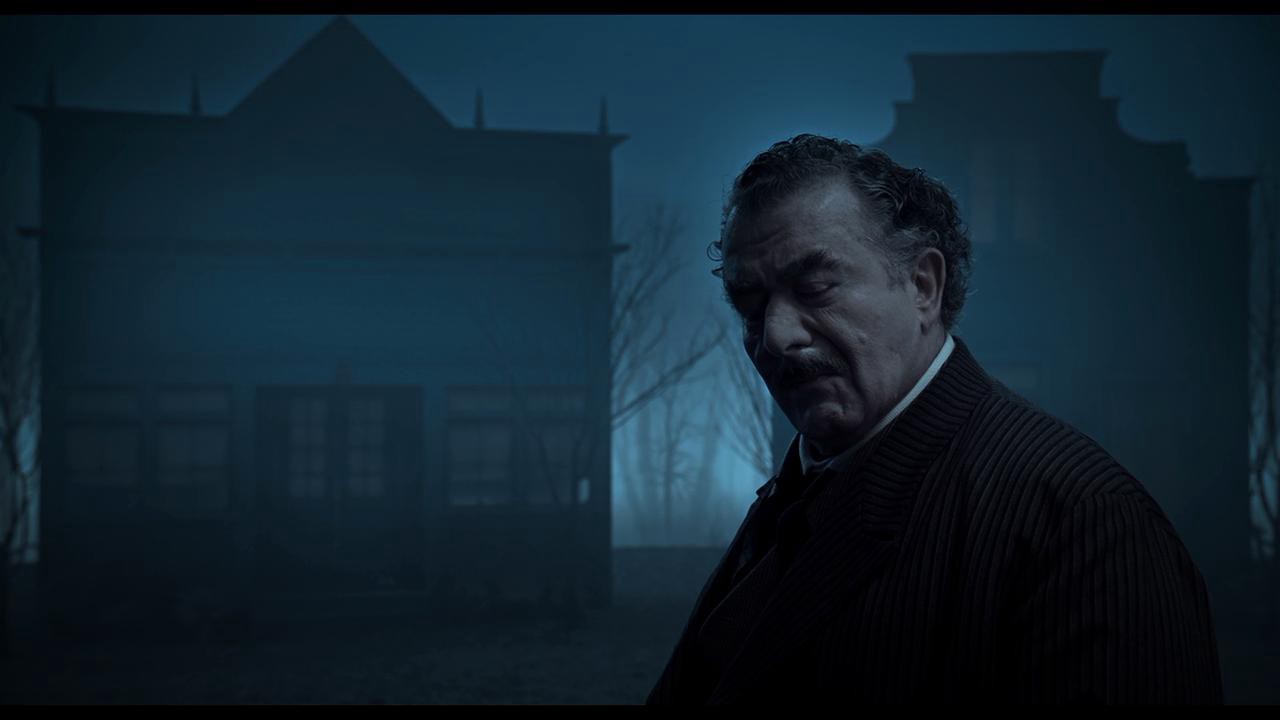 Not a real place.
Not a real place.
The Gambler is left alone on the staircase. He glances back, and we see that the small buildings across the street are undisguised scenic fronts, filmed and set in such a way as to make it clear they have no interior. They stand, flat and unconvincing, against a barren foggy plain that stretches all the way to the horizon, very much like a carelessly constructed background set in a soundstage (which this clearly is, in contrast to the outdoor location shoots in the rest of the film). We see the coachman and carriage departing over his shoulder, needing neither rest nor payment before heading back for his next round of passengers; then cut to an even more suggestive shot of the reapers ascending the staircase with their cadaver in tow. Rene musters his courage, defiantly places his hat on his head, and marches through the doorway and into the Afterlife. The picture fades back to the final page of the book we?ve been reading since the start of the movie, and its final line:
?The Trapper, who had spoken so many words and for so long, no longer had any use for them. He settled in for a long quiet.?
Then an unseen hand turns the final page and closes the cover of the book, revealing a final illustration of a horse looking back over his own rear ? The End, if you will. Classic.
And that?s the end of this series, as well. I started writing it just after the movie premiered in February, and have continued to write and release one chapter at a time from various countries on three different continents. I think it?s safe to say these six articles comprise the most thorough work on The Ballad of Buster Scruggs available at present, and I might put them all together into a book or something and make that available on Amazon. As my other articles peak and decline, this series continues to draw a few hundred views a week; and it?s gotten me picked up by the Noteworthy publication, as well as earning me the title of Top Writer on the subject of Movies (whatever that means). Isn?t it funny how things go? I saw that my favorite writer/director duo had released a new movie, watched it in bed one night, and followed my obsession as far as it would take me. Seven months later, I guess I?m about done. Ready to take a breather, at any rate.
Thanks for reading, cousins. ? N.
